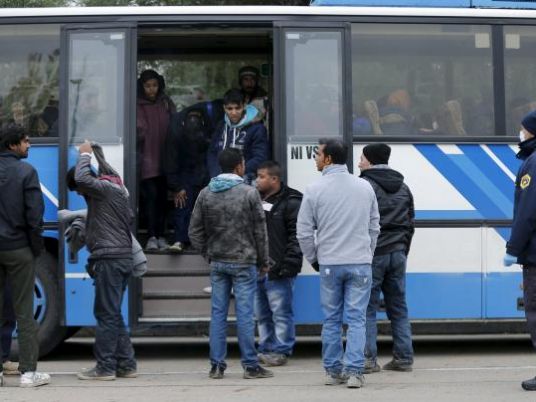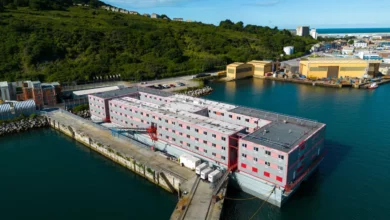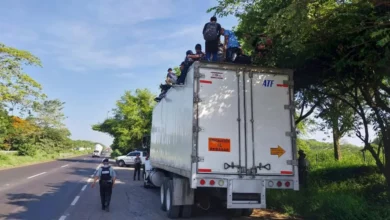
Buses packed with migrants backed up on Serbia’s border with Croatia on Sunday, their passage to western Europe slowed by a new diversion through Slovenia, which vowed to limit the influx.
Many spent the night on the buses, wrapped in warm clothes and blankets against the autumn cold, waking to dense fog and another hours-long wait around a kilometer from Serbia’s western border with the European Union.
Slovenia said it would only accept as many as are able to exit the country into Austria.
“Croatia asked us to accept 5,000 migrants per day, but Austria told us they can accept at maximum 1,500,” Bostjan Sefic, state secretary at the Slovenian Interior Ministry, told a news conference.
“We cannot accept unlimited numbers of migrants if we know that they cannot continue their journey.”
Some 3,000 migrants, many of them Syrians fleeing war, entered Slovenia from Croatia on Saturday after fellow EU member Hungary sealed its southern border with Croatia at midnight on Friday.
Hungary’s right-wing government says the mainly Muslim migrants pose a threat to Europe’s prosperity, security and “Christian values”, forging ahead with a unilateral crackdown in the absence of EU unity.
The arrival of a projected 700,000 migrants this year to Europe’s shores, fleeing war and poverty in the Middle East, Africa and Asia by boat and dinghy across the Mediterranean and Aegean seas, has exposed deep and often ugly divisions in the EU.
EU members Croatia and Slovenia have both said they will not stop migrants from crossing providing Austria and Germany also keep their doors open.
But while Slovenia says it wants to limit arrivals to around 2,500 per day, upwards of 5,000 daily are crossing from Greece into Macedonia and then Serbia.
Tempers fray
Aid agencies are concerned about backlogs building in the Balkans, lashed by autumn winds and rain and with winter on its way.
Sefic said he believed Croatia, Serbia and Macedonia would also have to take measures to slow the flow.
In Serbia, tempers frayed as overstretched police officers tried to keep order around a kilometer short of the border, where some 40 buses packed with migrants were stacked up in the village of Berkasovo. On reaching the border, migrants disembark and cross by foot.
“This part of the trip has lasted 20 hours, and we’ve been here for almost 12 hours,” said Khair, 40, a former sales manager from the Syrian capital, Damascus. “What can we do? We’re here and we have to wait.”
Some climbed over a wire fence into an apple orchard and corn field to forage for food.
“We’ve been here for 20 hours; we need water, food, there are women, babies in the bus,” said a bus driver who gave his name as Miroslav. “Who on earth coordinates this? It’s a mess.”
The EU has agreed a plan, resisted by Hungary and several other ex-Communist members of the bloc, to share out 120,000 refugees among its members.
It has also proposed giving Turkey three billion euros (US$3.4 billion) in aid and the prospect of easier travel visas and “re-energized” talks on joining the bloc if it helps stem the flow across its territory. [ID:nL8N12F5BD]
Slovenia's Sefic said the problem would need to be resolved in Greece, where most migrants arrive.
In the meantime, he said, “We insist on balancing inflows and outflows of migrants on a daily basis or on the basis of several days … and for now we will not change that decision.”




